
 Funds are pinning hopes on Carbo Ceramics
Funds are pinning hopes on Carbo Ceramics
HAVE mutual fund managers left caution behind when it comes to the fracking boom?
Carbo Ceramics, a Houston-based oil services company that is the world’s largest producer of tiny ceramic balls that can boost the production of fractured wells, may hold the answer.
Shares of the $3.4 billion market cap company are proving to be a battleground between bullish US fund managers and analysts who hold a more tepid view of its prospects.
The number of funds taking new positions swelled by 63 last quarter – an increase of 36 per cent - according to Morningstar data. An array of funds, including the $8.3 billion Baron Growth Fund and the $894 million SouthernSun Small Cap fund have added to their existing shares, according to Thomson Reuters data.
Analysts, however, question whether the enthusiasm is fully warranted. At approximately $143 per share, Carbo Ceramics is up 23 per cent this year and trading in line with the average target price among analysts tracked by Reuters, a sign that they see they stock as fully valued. Eight of the 12 analysts have a rating on the company of ‘hold’ or below, meaning that they do not recommend that clients buy additional shares.
Shares of Carbo Ceramics trade at 29 times next year’s estimated earnings, a valuation roughly double the average in the oil services industry, according to Thomson Reuters data.
And in a sign of investor scepticism, short interest is rising, with 19 per cent of available shares on loan to investors who have sold them, betting that their price will fall.
Whether Carbo Ceramics’ share price is justified will be revealed in part by its next quarterly earnings report, scheduled for July 31. Analysts expect the company to report revenues of $164 million, a 7 per cent gain from the same quarter last year, and earnings per share of 95 cents, a 21 per cent gain from the year before, according to Thomson Reuters data.
At issue is the extent to which the nearly three-decade old company can convince drillers that its ceramic products are more valuable over the long run than sand, despite costing nearly three times as much per pound and raising well costs by $1 million or more.
Both sand and ceramics are known as proppants, which essentially help keep fractured wells flowing by keeping cracks in shale rock open. The cost of sand has roughly doubled over the last year, to up to 10 cents per pound, as demand has increased and parts of Wisconsin and Minnesota have announced moratoriums on opening new sand mines.
Carbo’s ceramic proppants, which account for approximately 85 per cent of its revenues, cost up to 28 cents per pound yet have been shown by impartial studies to increase the long-term production of a well by between 20 and 100 per cent over sand. That is largely because ceramic proppants retain their shape better than sand, which can be crushed by the pressure of deeper wells.
The sand approach remains more popular with investors. Shares of big sand producer US Silica Holdings, have jumped approximately three times as much Carbo, yet still trade at a lower valuation based on forward price to earnings.
The use of ceramic proppants is most pronounced in the largest shale formations in the US, which are marked by deeper wells.
The Bakken field in North Dakota, for instance, accounts for approximately 66 per cent of demand for ceramic proppants, says March Bianchi, an analyst at Cowen & Co, who sees that market expanding.
“If you look at the recovery rates, it pays for itself. Particularly in Russia and Latin America, that’s just starting to sink in,” says Tim Hanson, a co-manager of the $211 million Motley Fool Great America fund, which has a position in the company.
The company is also set to release a new product, which it deems Kryptosphere, designed for deep water wells such as those in the Gulf of Mexico, he added.
Yet some analysts say that the broad rise in fracking stocks has pushed shares of Carbo Ceramics beyond their fair value.
The company is “perhaps unrightfully,” benefiting from broad investors demand, says Blake Hutchinson, an analyst at Howard Weil, a New Orleans based energy research and brokerage firm.
Low natural gas prices have cut into production at Hanesville Shale, whose deep wells provided a large market for ceramic proppants, says Trey Stolz, an analyst at New Orleans based Iberia Capital Partners. Drillers in areas which do not require ceramic proppants do not appear to see much of a need for them yet, he added.
“We’re not going to see a broad uptake any time soon,” he says.



































































